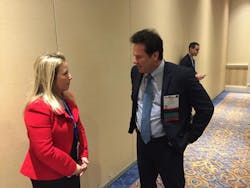Shorter trailer trade cycles may result from new food safety rules
Refrigerated motor carriers may need to rethink their trailer trade cycles in light of new food safety transportation rules that went into effect this past April, argued Don Durm, vice president of customer solutions for PLM Trailer Leasing, during a presentation at the 2017 International Foodservice Distributors Association (IFDA) conference, held at the Gaylord Convention Center in National Harbor, MD, this week.
“My job here is to make you feel uncomfortable, because I promise you, your customers are way ahead of you on FSMA [Food Safety Modernization Act] compliance,” he explained.
“Understand that some 128,000 people are hospitalized and 3,000 die every year from food-borne related illnesses. Compare that to the 5,000 or so who die annually from texting while driving,” Durm added. “So you need to understand that your customers are going to hold you to a way-higher standard than what the rules call for.”
Why will fleets need to potentially shorten their refrigerated trailer trade cycles as a result of that focus? Durm said it is due to the gradual “degradation” of trailer insulating properties – degradation that can be significantly speeded up due to damage, he stressed.
“Some 35% to 40% of [refrigerated] insulation degradation occurs within the first five to six years of a trailer lifespan,” he noted. “The impact of age is pretty substantial on reefer trailers.”
Durm emphasized that temperature control matters when it comes to the new food safety rules, because local law enforcement – which will be tagged to enforcing those rules – will most likely not allow much variance. For example, he noted that in Indiana, foodstuffs just two degrees out of their recommended temperature range can be destroyed.
Yet Durm also pointed out that shorter trade cycles can offer refrigerated carriers cost savings over time.
“Older reefer trailers burn more fuel,” he said, largely due to the need to run their refrigeration units longer to compensate for degraded insulation. “The rule of thumb we use for [reefer unit] fuel consumption is one gallon per hour, but I’ve seen older models burning 2.4 to 2.5 gallons per hour.”
That extra fuel cost added to extra maintenance costs to keep older trailers up to spec pushes up life cycle costs, Durm noted, thus potentially making a shorter trade cycle a better deal in the long run.
“It’s all about driving cost out of a [foodservice] business that exists in a 2% margin world,” he stressed. “You need to periodically evaluate your current trailer spec and operating lifecycle for, remember, [reefer] trailers lose efficiency as they get older.”
A few other points Durm made during his presentation:
- The FSMA is 300 pages long. “And it takes about 270 pages just to explain the six to eight pages of actual rules within that legislation,” he said.
- The FSMA should really be called the “Food Safety Documentation Act” because of all the documentation requirements placed on shippers, brokers, carriers and receivers.
- Don’t impede the airflow within a reefer trailer; airflow is critical to maintaining temperature. He suggested 4 in. of floor clearance and 9 in. of ceiling clearance within a reefer trailer at a minimum to ensure proper airflow.
- The loading process is critical to maintaining proper food temperature, including how food shipments are staged prior to loading – especially if they sit on a dock for extended time periods. “So much is lost during the staging process,” he said.
- “Remember, these rules are about ‘food safety,’ not ‘food quality,'” Durm emphasized.
About the Author
Sean Kilcarr
Editor in Chief
Sean Kilcarr is a former longtime FleetOwner senior editor who wrote for the publication from 2000 to 2018. He served as editor-in-chief from 2017 to 2018.

